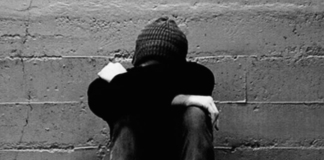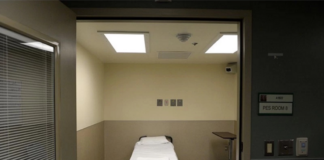Tag: forced commitment
Illegal Fraud is the Norm for Psychiatric Commitment
Rob Wipond reports on more investigations that reveal systemic abuses of patients’ rights.
Crisis Hotlines, Like Canada’s New 988, Promise Confidentiality. So Why Do...
In commentary for the Globe and Mail, Rob Wipond, MIA contributor and author of Your Consent Is Not Required: The Rise in Psychiatric Detentions,...
In Andrew’s Honor: Attorney Elizabeth Rich’s Fight Against Unjust Commitments
Anyone detained and then formally committed under Wisconsin’s civil mental health laws can initially be held and forcibly drugged for six long months. Yet, for years, not a single person has been able to appeal the six-month commitments in court.
Cindi Fisher on Hunger Strike: Free My Sidd
Cindi Fisher has gone on a hunger strike to demand that her adult child, Siddharta, be freed from Western State Hospital after being suddenly removed from the discharge list without explanation.
Kerry O’Malley: A Personal Struggle Against Forced Medication
Neglect for personal autonomy is a pervasive attitude in the mental health system. No human being should be stripped of their dignity and autonomy, much less a vulnerable 74-year-old woman.
Jinxed: The Persecution of Evan Durst Kreeger
I am very concerned that Evan is about to be devoured by psychiatry's maw. Things could be different if Evan were able to hire an attorney or attorneys to deal with all of these different legal actions coming at him and otherwise protect his interests such as sue the trustees for their unconscionable actions, but as I have indicated, his trustees have cut off his money so he can't hire such an attorney or attorneys.
When Mental Health Treatment Becomes a Violation
From InDaily: "In the early 2000s when I was detained in a psychiatric hospital I was treated against my will, I was even secluded....
The Forced Psychiatric Treatment of a Child
This is my story of forced psychiatric treatment as an eight-year-old girl, from my perspective as an adult mental health professional. Being held down kicking and screaming to be injected with a benzodiazepine is a human rights violation no child should endure for saying no to a pharmaceutical. In hindsight, when I reflect on that day, it feels like a form of child abuse.
“Liberty versus Need — Our Struggle to Care for People with...
In an editorial for NEJM, Lisa Rosenbaum, MD, discusses the decision to use involuntary psychiatric commitment.
Article →
The Helping Room
Every culture has its share of individuals who break down in bewilderment. People who hallucinate, behave beyond norms, seek to die, think in strange ways.
The Mental Health Reform Act of 2016 (SB 2680) Would Be...
There is indeed a crisis in the mental health business. The crisis derives from psychiatry's spurious and self-serving premise that all significant problems of thinking, feeling, and/or behaving are brain illnesses that are correctable by psychiatric drugs.
Dear Boston Globe, Part IV: A Taste of Your Own Medicine
The Boston Globe paints a picture (in the vivid way that they so love to do) that pins the system’s decline primarily on budgetary issues, but there is more than one way for a system to be ‘broken.’ In fact, where the Globe goes most wrong in their latest piece, ‘Community Care,’ is in their failure to adequately recognize that the system has always been broken in one way or another in this country.
A Diluted Murphy Bill Clears the House and Goes to the...
Organized psychiatry, committed irrevocably and wholeheartedly to drug pushing and to their corrupt and corrupting relationship with pharma, simply will not countenance the fact that their primary product is fundamentally flawed and destructive. So they hire a PR company; they fund and lobby politicians; they parrot slogans; and they encourage one another to ever-increasing heights of self-congratulation. But they will not commission a definitive study to clarify and assess the scale of this problem once and for all. And the reason for this inaction is because they know that it would be bad for business. It would "cause a lot of people to stop taking their medications."
The Murphy Bill, HR 2646 — a Heinous Piece of Legislation...
The National Coalition for Mental Health Recovery is calling upon all people of like minds, who care about individuals who need mental health services, to ACT. It is urgent. Please call your representative in the House of Representatives to vigorously oppose HR 2646 on Tuesday, July 5, 2016. And, call your Senator to insist that the Senate reject any amendments or changes to mental health legislation from the House by Friday, July 8, 2016. For more information about this Call to Action, please click here.
In the Matter of the Hospitalization of Mark V
Today, July 1, 2016, the Alaska Supreme Court issued its Opinion in In the Matter of the Hospitalization of Mark V. What strikes me the most about the case is that Mark's expressing the view that a psychiatric drug he was being required to take is poison, that it had side effects related to his sexual performance, and that it was killing him were all cited as proving Mark was delusional. As readers of this site know, these drugs can quite reasonably be characterized as poison, they do cause sexual dysfunction, and they are quite lethal to many many people, shortening lives on average by 25 years for those in the public mental health system, such as Mark.
Forced “Treatment” is Torture
I have opposed involuntary treatment for my entire career and first began criticizing it in the medical literature in 1964. As Thomas Szasz originally taught, involuntary psychiatric treatment is unconstitutional and an assault on basic human rights. I am also against it on scientific grounds, because after hundreds of years, this violation of human rights has generated no scientific studies to show that it benefits its victims. I am encouraged by the excellent blog by Peter C. Gøtzsche on MadinAmerica.com, which inspired me to put a new section, Psychiatric Coercion and Involuntary Treatment, on my website, and to compose these further observations of my own.
Lancet Editorial Points to “Trouble with Psychiatry Trials”
While clinical trials make up the “bedrock of evidence-based medicine” in other specialties, psychiatry faces a number of both ethical and scientific problems related to its use of randomized control trials. According to a new editorial in The Lancet Psychiatry, the field of psychiatry research has particular problems with ethical issues in recruitment, inaccurate classification systems, and controversial placebo comparisons, and then, once the studies are finished, it often remains unclear what the “outcomes actually mean for people’s lives.”




















